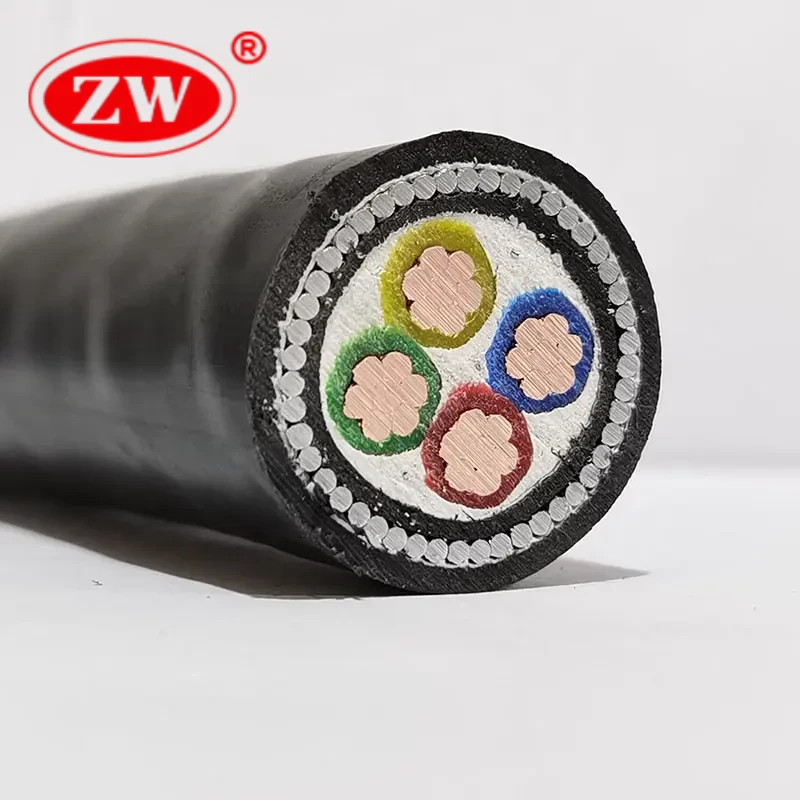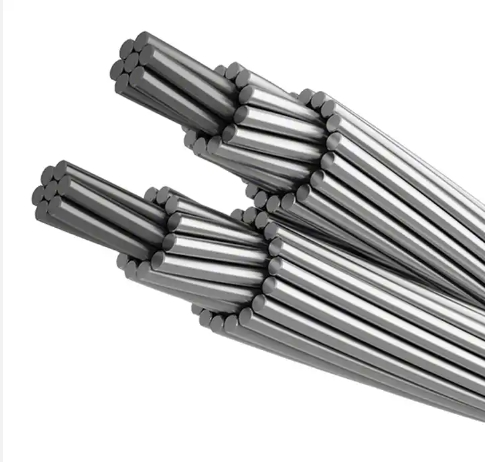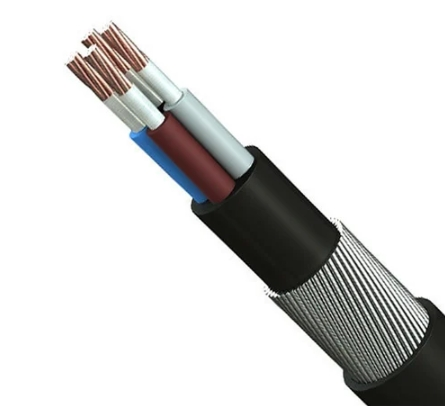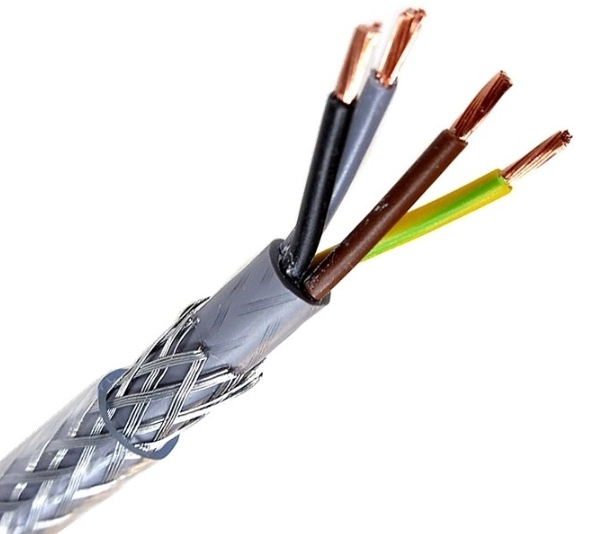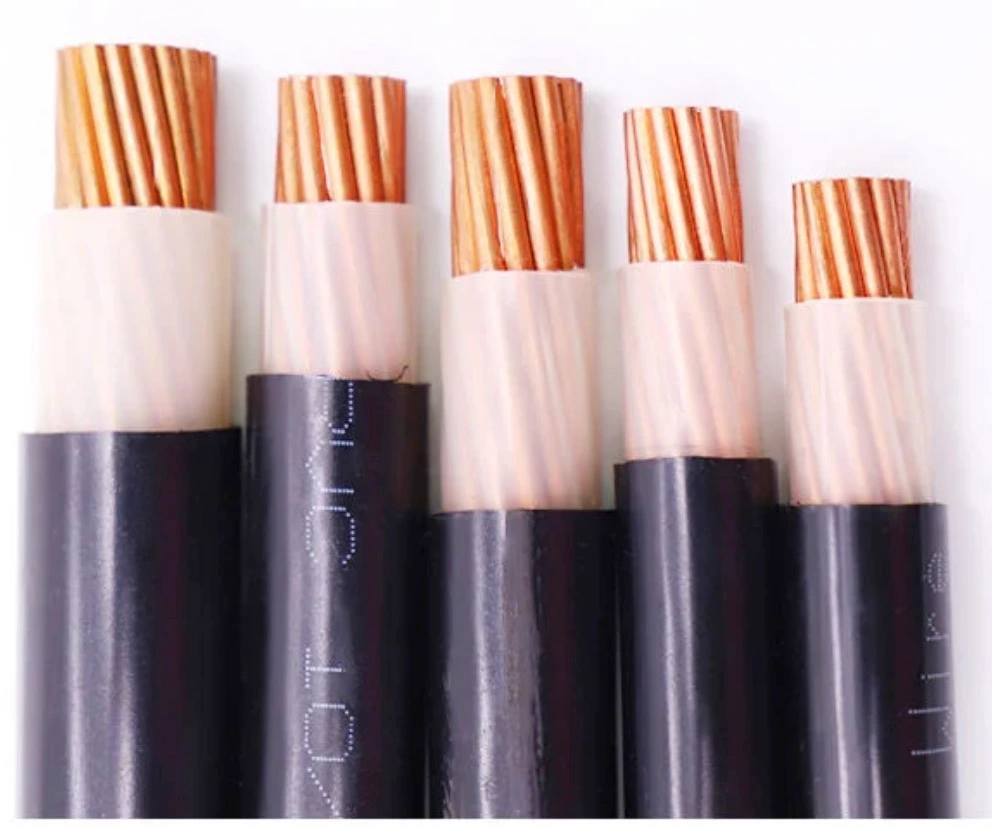Electrical wire for house is a necessity for your living space. Whether you’re renovating, replacing old wiring, or tackling a new project, electrical cable or house wire is an ultimate concern. Being a safe and reliable material, electrical wire is essential for all house wiring projects.
Electrical wiring is a crucial component that cannot be overlooked. It allows us to power appliances, turn on lights, and keep our homes safe and functional.
However, understanding the different types of electrical wire for house wiring and the components and systems involved can be daunting. That’s why we’ve compiled this comprehensive guide designed specifically for professionals like you.
This article will provide an in-depth overview of the essential guide to electrical wire for house wiring, including the different types of wire, the components and systems involved, and the importance of electrical wiring in a house.
So, let’s dive in and gain the knowledge necessary to create safe, functional, and efficient electrical systems in our homes.
Types of Electrical Wires and Cables
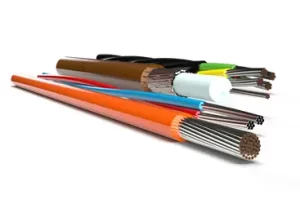
It is essential to understand that electrical wire for house types and electrical cables differ. An electrical wire is a type of conductor that transmits electricity from one point to another. In contrast, an electrical cable comprises multiple wires for various applications. The two most common types of electrical wire for house wiring are copper and aluminum.
Electrical Wire VS Electrical Cable
Although wire and cable are commonly used interchangeably, they have distinct meanings. An electric wire is a single electrical conductor, while a cable consists of multiple conductors or wires enclosed in insulating sheathing. Electric wires can be crafted from various materials such as copper or aluminum and handle everything from simple residential circuitry to complex industrial equipment.
On the other hand, electrical cable is one of the most common types of wiring used in modern homes. While cables can be made of mostly insulated copper wires inside a plastic jacket, they usually contain two or more insulated conductors twisted together and enclosed in a single jacket. Generally speaking, the electrical cable is thicker than electrical wire and designed for various tasks, including power distribution and providing a ground path.
Both conduct electricity safely; however, there are several differences. Standard electrical wire for house wiring is copper, while aluminum wiring in-house is often used in older homes due to its malleability and lower price. There are different electrical wire types and uses; let’s discuss each one by one.
NM Cables:
House wiring is essential to a house’s infrastructure, but it also requires some effort to get it right. NM cables, or Romex cables, are the most common home wiring used today. These cables contain multiple conductors wrapped in a flexible plastic jacket for dry, interior wiring applications like fixtures, appliances, switches, and outlets.
Do you know?
These NM cables are often color-coded for convenience and reliability to identify electrical amperage quickly. Common electrical wire for house includes 6-gauge 55 amp circuits with black sheath, 8-gauge 40 amp circuits with black sheath, and 10-gauge 30 amp circuits, all of which ensure that your house is electrically ready to go.
Types of wiring in old houses may not be as efficient as modern NM cables, so replacing old wiring is highly recommended.
Armoured Cables:
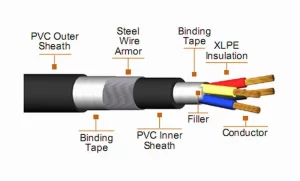
Do you know that armoured cables are more durable than any other type of electrical wiring? Armoured cables, or AC cables, are often used in exposed areas such as underground installations and high-traffic corridors, but they can also be used in homes.
These cables are composed of multiple conductors enclosed in a flexible steel armouring layer and covered with a protective plastic jacket or sheathing.
In Other Words,
This protective layer makes the cables better able to withstand physical damage, which makes them perfect for applications requiring extra protection from abrasion or corrosion. AC cables are usually heavier than other types of electrical wiring.
They require special tools for installation, but their added durability can make them a worthwhile investment in the long run.
House ground wire is often installed with armoured cables to ensure the highest level of safety and protection. Some common sizes for AC cables include 1.5mm house wire, 2.5mm house wire, 4mm house wire, and 6mm house wire. If you want the best quality electrical wire for house wiring, armoured cables are recommended.
THHN/THWN Wires:
House wiring requires that all wires be insulated and rated for the electrical current they will carry. THHN (Thermoplastic High Heat-Resistant Nylon) and THWN (Thermoplastic High Water-Resistant Nylon) wires are two of the most common types of insulated electrical wires for house wiring. THHN and THWN-2 wires can be used in dry or wet locations if the temperature does not exceed 90°C.
Keep in mind:
These are the single conductor and color-coded wires primarily used in residential and commercial buildings for general wiring applications. If you are using THHN/THWN wires, then rewiring a house cost can be a little more than another wiring, but the added safety and protection make it worth the extra money.
The color codes for THHN/THWN electrical wires for house wiring are:
- Hot wires are generally identified by the colors black, orange, or red.
- Neutral wires are identified by either white or brown coloring.
- All ground wires are easily identifiable by their green or yellow-green coloring.
Low Voltage Wire
If you need an electrical wire for house with less voltage than an AC cable or THHN/THWN wire, then a low-voltage electrical wire for house may be the perfect solution. Low-voltage wires carry less than 50 volts of electrical current and can be used in applications such as doorbell wiring, landscape lighting, and thermostat wiring.
Low voltage wires are generally insulated with PVC (Polyvinyl Chloride) or rubber and can be identified by their smaller AWG rating. These wires require specialised installation tools and should only be handled by a professional electrician.
Security System Cable
These cables are essential for transmitting critical information between all nodes in a security or communication system, connecting them, and ensuring their functionality. Low voltage wires are available in 2, 4, and 6 conductor configurations, which are color-coded for easier identification.
Audio Cable
Audio cables connect electronic audio components, such as amplifiers, receivers, and CD players. They are usually made of copper-clad aluminum or pure copper wire covered in rubber or plastic insulation. Audio cables come with either unbalanced (single conductor) or balanced (two conductors twisted together) configurations.
Landscape Lighting Cable
Landscape lighting cables are designed for low-voltage external systems, such as garden and driveway lighting. These cables come with two or more insulated conductors twisted together and enclosed in an outer sheath that helps protect the wiring from external elements.
Underground Feeder Cable
Electrical wire for house consists of cables installed inside your home and those running from the breaker box to outside service posts. Underground feeder (UF) cable is designed for direct burial in soil or concrete and can be used for indoor and outdoor applications.
Unlike NM electrical cable for house, underground feeder cables consist of solid plastic sheathing, providing additional protection against water and other elements. UF cables come in many sizes and styles, so it is essential to consult a professional electrician to ensure you are using the correct wire for your application.
No matter the type of wire you need, it is essential to always use high-quality electrical wire for house that meets the requirements of your home or business. Quality electrical wiring is essential for ensuring the safety of your home or office and should be installed by a qualified electrician. With the right type of wire, you can ensure your house wiring is done correctly and safely.
Copper Wire
The most reliable type of electrical wire is this one. It has impressive electricity-conducting capabilities and a long lifespan, making it the choice material in the industry. Copper Wire is also corrosion-resistant and can be used indoors, outdoors, and wet/dry.
Aluminum Wire
Another popular alternative for electrical wire is aluminum. This type of wire offers excellent advantages, such as being lightweight and cost-effective. It’s best used when weight is a factor, such as in aircraft wiring. This wire is an excellent conductor of electricity and is more affordable than copper. However, the downside to this type of wiring is that it lacks durability compared to copper and may corrode faster.
How to Select Perfect Electrical Wire Size for House?
The electrical wire for house needs a proper size to ensure adequate power supply and safety and prevent heating. The wire size depends upon various factors that help to select the perfect size for your house.
The factors to consider while selecting an electrical wire size are:
- Voltage Drop
The amount of power loss due to resistance in the wire is known as Voltage Drop. To get a stable voltage supply, the cable should be able to transmit the current without any voltage drop.
The voltage drop depends upon the current flow, length of the wire, and material of the wire.
- Ampacity
The amount of current a wire can safely carry is known as ampacity. The wire size should be selected based on the load requirement and according to local electrical codes. Long wires will require bigger sizes than short wires.
- Ground Fault Circuit Interrupter (GFCI)
GFCIs are used for extra safety measures by cutting off the power supply whenever there is an imbalance in current flow. GFCIs should always be combined with proper-sized wire to ensure maximum protection from electric shocks.
- Environment
The size of electrical wire for house also depends upon the environment in which it is placed. Wet or humid places need special insulation material to protect from water and moisture. Every material has a different wire size requirement and should be selected accordingly.
Considering these factors, one can easily select the perfect size of your electrical wire for house, office, or any other project.
National Electric Code (NEC) Guidelines
Apart from the factors mentioned above, one should always follow national electric code (NEC) guidelines for electrical wiring. NEC provides safety requirements and installation rules to protect your property from damage or shock hazards.
Some of The NEC guidelines are:
- Use a separate circuit breaker for each appliance or equipment.
- All the wires should be properly connected to the breaker box.
- The wire size should not exceed the load requirements of an appliance.
- Grounding and bonding should be done as per NEC guidelines.
Following these guidelines will ensure that your electrical wire for house is done safely and by the NEC guidelines.
Understanding the American Wire Gauge (AWG) System
American Wire Gauge (AWG) system is a standard unit for measuring electrical wire sizes. This system helps to differentiate between different wires and their capabilities.
You Should Know:
The higher the gauge number, the thinner the wire will be.
For example, 12-gauge wires are thicker than 14-gauge wires. The AWG system is most commonly used in North America, and not all countries use the same system. AWG plays a significant role in selecting the proper electrical wire size for house.
Importance of Proper Wire Sizing
Proper wire sizing is of utmost importance in electrical wiring, as it directly impacts the safety and efficiency of the system. Choosing the correct wire size ensures that the current flowing through the wire does not exceed its maximum rating, preventing the risk of electrical fires or appliance damage.
Using undersized wires can lead to overheating and melting, while big wires can be costly and wasteful, as they are often more expensive and harder to work with. In addition to safety concerns, correct wire sizing affects the system’s efficiency, as undersized wires can cause voltage drops, leading to reduced power and potential damage to connected devices.
Therefore, ensuring proper electrical wire for house is essential to designing and installing electrical wiring in homes and buildings.
Electrical Wire Installation
We truly understand that it is not an easy task to install electrical wire for house. It requires knowledge and experience to ensure that all the safety standards are followed during wiring installation. If you are not confident about handling electrical wire for house, it is wise to contact a professional electrician who can take care of everything for you.
The right electrical wire for house selection and installation are crucial to ensuring your home’s safety. Some of the factors that should be taken into consideration before making any changes to your home’s electrical wiring include
A. Preparing for Installation
Before beginning any electrical wiring project, planning for the process in advance is essential. Make sure all the tools and materials needed are available and create a drawing of your home’s layout so that you know where each wire should be placed.
B. Safety Considerations during Installation
When working with electricity, it is essential to take safety precautions. Ensure you wear protective gear and keep children from the area while wiring. Also, make sure all power sources are turned off before beginning work.
C. Tools and Materials Needed For Installation
To properly install electrical wire for house, you need various tools and materials. These include wire strippers, wire cutters, a voltage tester, and non-conductive tape. Additionally, you will need multiple sizes of wires based on the load requirements of your appliances.
D. Step-By-Step Installation Process
Once you have gathered all the necessary materials and tools, you can begin the installation process. Start by connecting the grounding wires to a ground rod or other metal part of the structure, then connect each wire to its designated outlet box.
Ensure that all connections are securely fastened together and that no two terminals are touching. Once everything is in place, use a voltage tester to check that all the connections are correct.
Finally, review your electrical wire for house installation once before turning on the power to ensure the electrical wire for house is properly installed and safe. By following these steps, you can ensure your electrical wiring project is successful.
Conclusion
This guide has everything from how to identify electrical cable sizes to which wire is best for electrical wire for house. Whether you’re looking for the right electrical wire or trying to figure out the cost of rewiring a house, we’ve got you covered.
With our in-depth overview of electrical wires and types of wiring used in houses, you’ll be well on your way to understanding the complexities of house wiring.
From aluminum to copper wiring and from 1.5mm to 4mm house wire, there are plenty of options for electrical wires for your home. Knowing which is best for your needs will ensure efficient and safe wiring, giving you peace of mind whenever you switch on your appliances or lights.
If you need any professional assistance, ZW cables are here to help. Contact us for more information about the best electrical wire for house wire and installation services!

